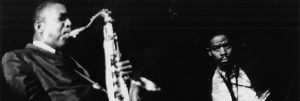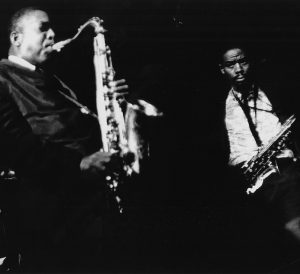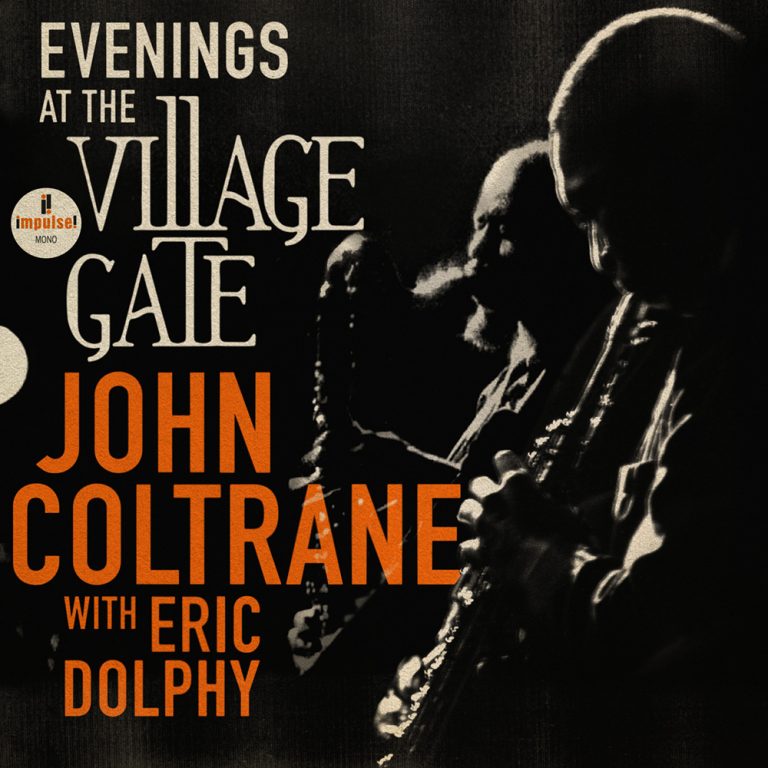This music is a nice little snapshot for us of where Coltrane was on those nights in 1961, and where everything was going. When I listen to these tracks, I can picture sitting inside of the club and being next to the stage, right up next to Elvin – the drum sound is so clear. I remember thinking, “Wow. He’s not in a straight-ahead pocket. He’s really in a zone.” When I sit in a club today, I love it when I can feel how the band is figuring out the music, and I’m trying to figure out what they’re going to do. These recordings definitely have that kind of vibe.
They’re not sounding like the Classic Quartet yet or even trying to sound like that. But I can hear how they’re starting to experiment and ask themselves, “Is it okay if I drop my ‘ones’ here?” “Is McCoy going to solo first or should I?” I love it because here’s a group that is already established and is going to change history and they’re going through the same process and uncertainty that we all go through when we get our bands together.
I don’t historically think about Coltrane precisely in terms of years. For me it’s more about his periods: Early Trane with Miles. Then Sheets of Sound, and after, Later Trane. And then, Even Later Trane. To my ears, this music feels like a great preview of something great that’s coming. But I’ll say this: if the other Tranes didn’t exist in the years before or after, and this music was all that we knew, it would still be life-changing.
Even the choice of songs – “When Lights Are Low” and “Greensleeves” – makes it sound like a band in transition, like they’re still playing music from their old gigs while they move on to newer things, which, in fact, is what happened. This is not to say one thing is better than the other. Listening to this music, I can tell they’re all into it, all the way. Everyone’s playing at a high level. John, Eric, Elvin, McCoy. And Reggie? I know his bass playing from more recent years. It’s great to hear him at this young age, getting himself together.

I was expecting not later Trane, but something closer to his freer period. When I heard this music my first reaction was – and I don’t mean this in a negative way – this is two-bands-in-one! The approach is different depending on who was playing lead. With Dolphy, they’re playing tunes. With Coltrane, it’s something else. But there’s no leader, per se. It’s a live set but it’s almost like they’re in a session, still working things out, but it hasn’t reached where it’s meant to go. There’s a wall they’re trying to break through and I’m not sure if part of that is Reggie, who’s playing exactly what he should be playing. He’s the anchor. Or maybe they’re just not ready yet, but they soon will be. I hear it especially in “Africa” and “My Favorite Things.” They’re really soul-searching.
About Coltrane’s own playing: this is not “sheets of sound,” not in the sense of what he was doing a few years before. That was more about technique. The energy here is different. It’s more of an emotional urgency. To me, as he got older, his playing started to abandon the way a jazz saxophone tone was supposed to sound. How you’re supposed to sing a note. I don’t think he was even thinking of it as a saxophone anymore. He’s looking for whatever sound he can find that evokes the emotion he’s feeling, so he’ll go high, crazy high, even if it starts squeaking. Or if he starts getting low, I can feel he is trying to embody something he’s feeling right then. He’s forceful – more focused and clear. It’s like Mike Tyson: you don’t want to get hit!

It would be great if Coltrane was still alive and we could ask him questions. I would ask him about this music from the Gate, where were you trying to get to, what were you visualizing at this moment? Did you feel restrained or were you breaking through? We know you were spiritual, that music for you held a divine purpose. It’s clear you’re trying to communicate with us each time you performed. What did you feel we needed to know in that moment at the Gate?
I’m so curious about those times. But I think it’s too easy to romanticize it all. I used to go to Roy Haynes’s house, and he used to tell me some crazy stories. Then he’d say, “I find it so funny you guys all want to listen to these bootleg recordings of Trane and me and hear how I sounded with him versus Trane with Elvin. I don’t want to hear that!” And I’m like, “Why not?” “Because the truth is, we weren’t making any money!”
Roy told me how at a certain point in time when Trane was calling him, Trane had a reputation for playing out and scaring everybody away. Sometimes it was hard to get good gigs and often they would put him at the end of a festival day. The music was great, but it wasn’t much money. It wasn’t easy then, just like it’s not easy now.
I think it’s wild that the Village Gate is still being used for music. It’s now called Le Poisson Rouge or LPR. I did my first album release party there, and that’s where I presented the music from “Pursuance”, my tribute album to John and Alice Coltrane. Most often they tear down historical places, so it’s special when you’re a new artist and you get to play in the same place where the real legends graced the stage. The place still has that energy. You can feel it. Like the song goes, I’m happy to be in a number.

Lakecia Benjamin is an American jazz, funk, soul and R&B alto saxophonist from New York City. She has shared the stage with Stevie Wonder, Missy Elliott, Alicia Keys, and The Roots.
Header image: Herb Snitzer/Courtesy of Impulse! Records



